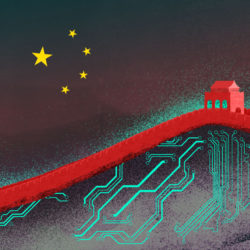BRI cash crash; Swiss skullduggery; brave Danes and cowardly bankers
Hello, and welcome to China Influence Monitor, a weekly newsletter published by CEPA and Coda Story and edited by me, Edward Lucas. We track the westward footprint of China’s influence operations, and point you towards this week’s best (and worst) coverage.
In this issue: China’s secret grip on Switzerland, Wolf Warrior diplomacy targets Denmark, HSBC caught out over Hong Kong, plus what we’re reading — and what we’ve been writing.
Sign up for China Influence Monitor, tracking the CCP’s westward influence
Chinese funding for foreign infrastructure projects shrivelled to just $4 billion last year, down from $75 billion in 2016, according to an analysis by the Boston University Global Development Policy Center, first reported in the FT. This is a game-changer. For years, China’s ever-open wallet funded influence operations all over the world, chiefly as part of the Belt and Road Initiative. But the projects were costly, murky and overhyped (see this take on China-Europe rail connections). As China pulls back, can Western lenders seize their chance?
Chinese police agents have since 2015 been allowed to conduct operations against Chinese people living in Switzerland — and quite possibly in other Schengen countries too. Now human-rights campaigners at SafeguardDefenders have uncovered the actual text of the secret deal, first brought to light by the NZZ am Sontag newspaper in August. The scheme would fit neatly into China’s “Fox Hunt” program, which pressures critics and troublemakers to return home under the guise of anti-corruption investigations. Swiss officials tried to conceal details of the “readmission agreement,” which expired on December 7 — and there’s now a (belated) row about whether to renew it.
Chinese pressure on Hong Kong has global effects. A foreign ministry spokeswoman in Beijing lambasted Danish politicians for daring to invite the former Hong Kong lawmaker Ted Hui to Copenhagen. This “violates the basic norms of international relations and damages the image of Denmark as a rule-of-law country.” Meanwhile, the nominally British bank HSBC controversially suspended bank accounts belonging to Hui — who lives in exile — his wife and his parents, and to a church run by embattled pastor Roy Chan. Both Hui and the church are under investigation for allegedly embezzling funds from crowd-funding campaigns. The bank says it obeys the law in jurisdictions where it operates — meaning it gets caught between Chinese control-freakery and what counts as fair play elsewhere.
Talking of control-freakery, spare a thought for Taiwanese scholars who say Chinese pressure has excluded them from a conference on quantitative biology at the International Centre for Theoretical Physics, which is jointly run by UNESCO and the Italian government.
Sign up for China Influence Monitor, tracking the CCP’s westward influence
THE PRICE OF CHINESE TIES
Western scrutiny and pushback against real or presumed Chinese influence is reaching levels that would have seemed unimaginable only a few years ago. The most striking example this week was that Norway’s deputy central bank chief resigned because being married to a Chinese citizen (she lives in China) meant his security clearance wouldn’t be renewed.
The squeeze on once-mighty Huawei continues too. Finland passed a 5G security law that bans “suspect” equipment, without mentioning the company by name. The Global Times quoted analysts saying that should allow Nokia to keep going in China. Meanwhile the well-connected Chinese technology giant sounded conciliatory about its tussles with the Swedish authorities, telling Reuters that it would do anything necessary to abide by whatever the new rules might require.
In a similar vein, the EU outlined a new regime for chipmakers to increase supply chain resilience. Citing national security concerns, Germany blocked the takeover of IMST, a satellite and radar technology firm, by the state-controlled China Aerospace and Industry Group (CASIC). Britain and Sweden are also toughening their regimes for foreign acquisitions; France and Italy have already done so, and the EU started screening foreign direct investment in October.
But these measures don’t stop investment in start-ups. Citing examples from Cambridge in the U.K. (a hotspot for Chinese influence) and from Silicon Valley, Elisabeth Braw in Foreign Policy highlights how “secret venture capital is handing power to Beijing under the radar.” Nobody knows how many Western start-ups have received Chinese venture-capital funding — much less what those start-ups are, or what links the Chinese investors have with the Chinese state. None of this is illegal, yet.
What we’re reading:
- This by Human Rights Watch on the “automated repression” of Uyghurs in their occupied homeland.
- The New York Times highlighted how Chinese propaganda outlets turned a German scientist, Alexander Kekulé, into an unwilling media star by twisting his words to make out that the coronavirus outbreak originated in Italy.
- The EU’s counter-disinformation unit has a useful compare-and-contrast briefing about Russian and Chinese mischief-making during the pandemic. Both countries are upping their “vaccine diplomacy” and decrying Western failures.
- The FT profiled foreign-ministry spokesman Zhao Lijian, a “populist provocateur who owes his career to a willingness to shock, needle and troll,” while the Global Times carried a long commentary blaming China’s “unconventional responses” on the Trump administration.
Sign up for China Influence Monitor, tracking the CCP’s westward influence
What I’ve been writing:
- This strategy paper for CEPA on how the West should stand up to China. Key points: “America First” doesn’t work against a global adversary so find safety in numbers (or at least coalitions); and fight the symbolic battles first.
- I’ve summarised it here in Foreign Policy.
Last but not least, you have probably spotted this Axios investigation of a Chinese influence operation targeting up-and-coming local politicians in the United States. One of the takeaways for me is that China patiently cultivates possible sources early in their careers. There must be many similar stories in other countries — and I’ll welcome tip offs.
That’s it for this week. I’ll be back in your inbox next Thursday.
Best regards,
Edward








